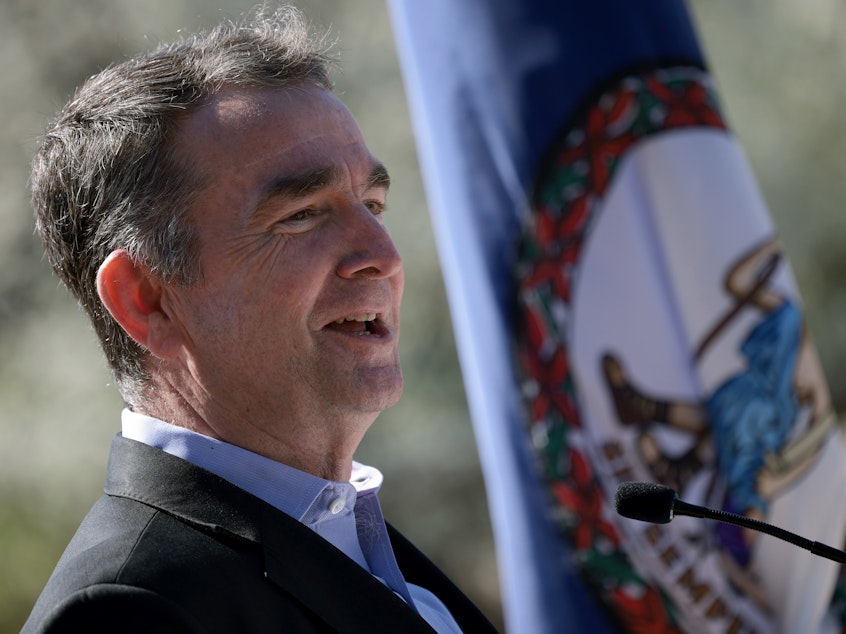Virginia Shifts $700 Million In Relief Funds To Boost Rural Broadband Access

Tony and Debbie Steffey are retirees who live on a fixed income in southwest Virginia, and they're desperate for internet. To get it, they'd have to pay $10,000 for a fiber line to their double-wide trailer in the community of Carbo.
"We don't have it, we have no choice," Debbie Steffey, 67, said of not having the money to pay for the construction of a line.
"We don't even have email or nothing," added Tony Steffey, 65.
It's the Steffeys' desperation that sent them to an event Friday in Abingdon, which is close to some of the state's most restricted areas for broadband access. They wanted to talk to U.S. Sen. Mark Warner of Virginia to find an answer to their internet woes.
There, at the Southwest Virginia Higher Education Center, Warner joined Gov. Ralph Northam, both Democrats, and other state officials to announce a massive infusion in internet service access. In all, Virginia will direct $700 million drawn from pandemic relief funds to boost broadband access and help close the digital divide for some of the poorest regions of the state.
Sponsored
It marks one of the country's largest investments in broadband to date, Warner's office said.
The move comes as Capitol Hill Democrats, along with a bipartisan group of senators, continue to work on spending plans that include measures to boost internet access around the country. A key vote on the bipartisan infrastructure proposal is expected in the Senate next week, and Senate Democrats are expected to reach an agreement on their proposal. Warner has been key in the construction of both legislative packages.
"This is a truly historic day. It has been a long time coming," Warner said Friday in Abingdon. "It is safe to say, with what the governor is doing today, there is no state in America that has as comprehensive a plan."
Northam said the investment will help the state reach its goal to close its digital divide by 2024. The funds will expedite deployment of last-mile broadband to underserved areas — a key obstacle in getting internet access to rural areas and poorer families.
"We are in a good position, well poised to have broadband to everybody in the commonwealth of Virginia by 2024," Northam said.
Sponsored
"This is a game changer"
The announcement was welcome news to many in the region Friday.
Travis Staton, president of United Way of Southwest Virginia, said the investment will be a boost for economic development, and he hopes the effort will draw new businesses to the region — and, in turn, more jobs.
"For quite some time we have had limited opportunities to really have a fair shot at business recruitment and really creating higher-paying jobs," Staton said.
Theresa Burriss, a professor and director of Appalachian studies at Radford University, also attended Friday's event. She lives nearby with her husband on a wooded, 123-acre property, and they finally got fiber to their home for internet service in the past month.
Sponsored
Burriss previously had to make due with a hot spot that provided poor service. It forced her to go to her school office to teach. But now she'll be able to work from home.
"This is a game changer," Burriss said. "I can be at home now and teach my class."
The focus on infrastructure
The announcement has political implications as well. Abingdon is one of the state's Republican strongholds, and Democrats are hoping to sell voters in deeply red pockets of the country on their massive infrastructure plans to gain buy-in and, perhaps, new supporters.
Warner is part of a small bipartisan coalition in Congress negotiating a $1.2 trillion deal, with almost half that in new spending, as Democrats work a dual-track system to come up with their own $3.5 trillion package. The bipartisan plan is considering a $65 billion effort to expand broadband access and affordability nationally.
Sponsored
The pandemic exacerbated demands for internet access, highlighting the worsening gap for families without it, including those looking to work online or seek medical help and students forced to attend school remotely.
Virginia's $700 million infusion is drawn from the $1.9 trillion American Rescue Plan that Democrats pushed through Congress on party-line votes in March.
It has sparked similar investments around the country focused on internet access.
For example, North Carolina recently moved to direct $750 million funding toward broadband. And California is considering a broadband boost that could go into the billions.
The push for expansion of broadband comes as concerns rise over the country's aging infrastructure, including roads, bridges and public transportation — key pieces of "hard" infrastructure that have taken the focus of the bipartisan group.
Sponsored
Meanwhile, Senate Democrats are looking to reach agreement next week for a reconciliation bill to bypass Republican objections for a larger, more ambitious plan they're saying is focused on "human" infrastructure. [Copyright 2021 NPR]



